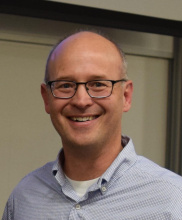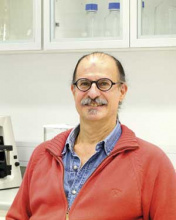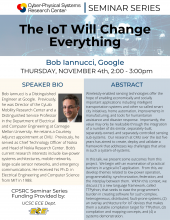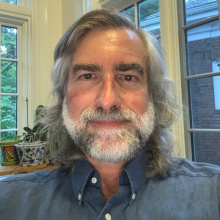CPS Events
ECE Seminar Co-hosted by CPSRC: Vision-Based Tracking with Small UAVs
Abstract
This talk will describe our current work on vision based autonomous target tracking and following using small UAVs. We will present a new multiple target tracking algorithm that is based on the random sample consensus (RANSAC) algorithm that is widely used in computer vision. A recursive version of the RANSAC algorithm will be discussed, and its extension to tracking multiple dynamic objects will be explained. The performance of R-RANSAC will be compared to state of the art target tracking algorithms in the context of problems that are relevant to UAV applications. We will also discuss recent research on vision based relative pose estimation. We will describe a technique for using point correspondences in video to estimate the camera pose, where the cost function to be optimized is derived from the epipolar constraint.
Bio
Randal W. Beard received the B.S. degree in electrical engineering from the University of Utah, Salt Lake City in 1991, the M.S. degree in electrical engineering in 1993, the M.S. degree in mathematics in 1994, and the Ph.D. degree in electrical engineering in 1995, all from Rensselaer Polytechnic Institute, Troy, NY. Since 1996, he has been with the Electrical and Computer Engineering Department at Brigham Young University, Provo, UT, where he is currently a professor. In 1997 and 1998, he was a Summer Faculty Fellow at the Jet Propulsion Laboratory, California Institute of Technology, Pasadena, CA. In 2006 and 2007 he was a visiting research fellow at the Air Force Research Laboratory, Munitions Directorate, Eglin AFB, FL. His primary research focus is autonomous control of small air vehicles and multivehicle coordination and control. He is a past associate editor for the IEEE Transactions on Automatic Control, the IEEE Control Systems Magazine, and the Journal of Intelligent and Robotic Systems. He is a fellow of IEEE and AIAA.
Artificial Pancreas Project in Argentina
Abstract
In this talk a brief introduction to diabetes and the glucose control through an artificial pancreas will be presented. The complete solution, from the computation of a control-oriented model, it’s (in)validation vs. experimental data, the design of a controller and its test through simulations and clinical trials will be described. The first three clinical trials in Latin America and some ongoing and future research are also presented.
Bio
Ricardo S. Sánchez-Peña has an EE degree from the University of Buenos Aires (UBA) and a MSc. and Ph.D. from the California Institute of Technology. In Argentina he worked in CITEFA, CNEA, CNIE and CONAE. He collaborated with NASA, the German, and the Brazilian space agencies. He was Professor at the UBA and in Spain (UPC) as an ICREA researcher. He was Visiting Prof./researcher in several universities and consultant for companies in the aerospace and energy areas in the USA and the EU. He received awards from IEEE, NASA and ANCEFN. Presently he is Director of the Research & PhD Dept. at the Buenos Aires Institute of Technology (ITBA), and Investigador Superior of the National Research Council (CONICET). He leads the Artificial Pancreas project in Argentina, he has also applied control to the COVID19 lockdown schedule, and currently works in identification and control applied to neurobiology.
The IoT Will Change Everything
Abstract
Wirelessly-enabled sensing technologies offer the hope of enabling economically and socially important applications including intelligent transportation systems and other so-called smart city initiatives, home automation, improvements in manufacturing, and tools for humanitarian assistance and disaster response. Importantly, the value may only be realizable through the integration of a number of dis-similar, separately-built, separately-owned, and separately-controlled sensing sub-systems. Our research at CMU over the last five years has aimed to create, deploy and validate a framework that addresses key challenges that arise in such a system-of-systems.
In this talk, we present some outcomes from this project. We begin with an examination of practical barriers in a typical IoT application. From this, we develop themes related to low-power operation, programmability, synchronization, federation, and the interplay between them. Within this context, we discuss (1) a new language framework, called TTPython, that seeks to ease the programmer's burden in creating software for such complex, heterogeneous, distributed, fault-prone systems, (2) an overlay architecture for IoT devices that makes them a suitable compilation target for TTPython, (3) compilation and mapping concepts, and (4) a systems demonstration.
Bio
Bob Iannucci is a Distinguished Engineer at Google. Previously, he was Director of the CyLab Mobility Research Center and a Distinguished Service Professor in the Department of Electrical and Computer Engineering at Carnegie Mellon University. He retains a Courtesy Adjunct appointment at CMU. Previously, he served as Chief Technology Officer of Nokia and Head of Nokia Research Center. Bob’s current research interests include low-power systems architectures, mobile networks, large-scale sensor networks, and emergency communications. He received his Ph.D. in Electrical Engineering and Computer Science from MIT in 1988.
Before joining Cisco in 1999, Flavio Bonomi was at AT&T Bell Labs, with architecture and research responsibilities, mostly relating to the evolution of the ATM technology, and then was Principal Architect at two Silicon Valley startups, ZeitNet and StratumOne.
He received an Electrical Engineering degree from Pavia University in Italy, and a Master’s and PhD in Electrical Engineering degrees in 1981 and 1985, respectively, from Cornell University in Ithaca, New York.
ECE Seminar Co-hosted by CPSRC: Towards Scalable and AI-Enabled Autonomous Systems
Abstract
Current autonomous systems, comprising of intelligent machines, devices, and software that are aware of and interact with their environment, have the potential to accomplish a previously intractable scope of tasks. Their ever growing capabilities are already enabling them operate in the real- world, making independent decisions and even learning in uncertain, unstructured, and unpredictable environments. These new systems will soon be able to replace humans in hazardous environments and tedious jobs, provide them with up-to-the-minute situational awareness, assist them in difficult or repetitive tasks, and enhance their capabilities. For autonomous systems to show their full potential, new methods are necessary that will allow them to seamlessly infer, reason, and act in the real-world using large amounts of data, learn from their experiences and improve their performance, accept naturally expressed instruction from humans, adapt and respond to unpredictable situations, and effectively interact with each other and humans to accomplish collaborative tasks.
Bio
Michael M. Zavlanos received the Diploma in mechanical engineering from the National Technical University of Athens, Greece, in 2002, and the M.S.E. and Ph.D. degrees in electrical and systems engineering from the University of Pennsylvania, Philadelphia, PA, in 2005 and 2008, respectively. He is currently the Yoh Family Associate Professor in the Department of Mechanical Engineering and Materials Science at Duke University, Durham, NC. He also holds a secondary appointment in the Department of Electrical and Computer Engineering and the Department of Computer Science. His research focuses on control theory, optimization, learning, and AI and, in particular, autonomous systems and robotics, networked and distributed control systems, and cyber-physical systems. Dr. Zavlanos is a recipient of various awards including the 2014 ONR YIP Award and the 2011 NSF CAREER Award.
The Barycenter Method for Direct Optimization: an Overview with Applications
Abstract
We will present properties of the recently developed barycenter method for direct optimization that make it particularly useful in control applications. Equivalence of the method's batch and recursive formulations can be used to show that it has descent-like properties, although no derivatives are used, and that it is robust to noisy measurements and lack of differentiability. As a relevant application example, the method can be employed in the joint estimation of parameters and switching times for hybrid linear systems, an important problem that can pose significant computational challenges due to the non-convex nature of the combined optimization.
Bio
Felipe Pait studied electrical engineering at the University of S Paulo, and received a PhD from Yale University in 1993, advised by AS Morse. He has worked on adaptive control and applications. Currently he is interested applying randomized optimization algorithms to classical open questions of adaptive control design, and in stability conditions for switched systems. He is associate professor at the University of S Paulo, Brazil, having dedicated substantial efforts to curriculum reform and multidisciplinary engineering education initiatives.






